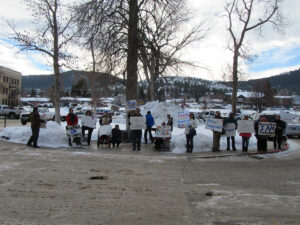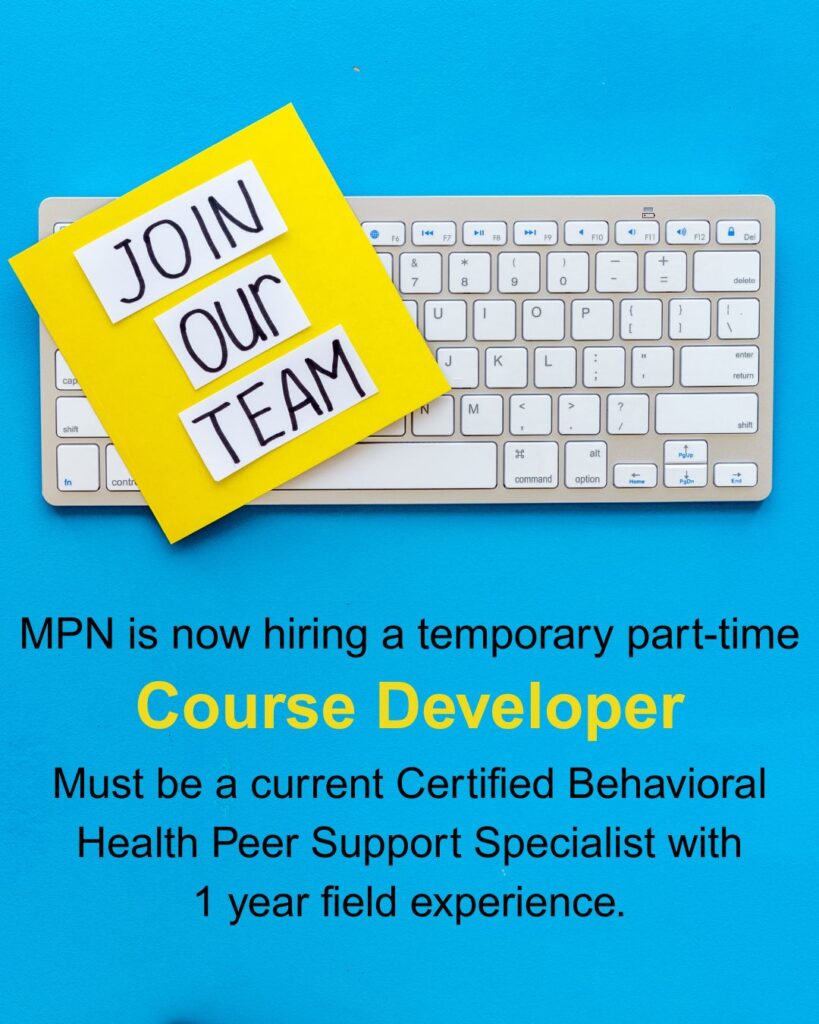We are a network of individuals who are on the path of recovery.
We identify as being in recovery from mental health, substance abuse and or addiction struggles. Together we share information, provide peer support, advocate with a united voice and improve the system. We come from places all across Montana, with different stories and experiences but together we make a difference. This is the Recovery Movement in Montana.



Realizing Recovery Blog
A Miracle in Recovery
This story is very close to my heart. Anna is my sister. I have seen her struggle since her teenage years. At the heart of her struggles, and only discovered in recent years, is her diagnosis of several mental health challenges. She was also adopted from South Africa as a toddler and has struggled with feelings of abandonment and attachment her whole life. Anna has fought family and friends in search of what would make her feel better, feel more. It has challenged our family as she has lost battles in the past.
A Personal Gratitude Challenge
As I typically do when writing on a topic, I looked for definitions and synonyms to make sure that my readers and I are on the same page. Gratitude is “the quality of being thankful; readiness to show appreciation for and to return kindness”. I like those words: thankful, appreciation, kindness. I think it is easy to say thank you, but more powerful to show appreciation and kindness. It is similar to how saying sorry is just a word, but an apology says why and how you will make it better. It carries more weight.
Sensory Processing Disorders
Sensory Processing Disorders (SPD) are a complex and often misunderstood set of conditions that affect how individuals perceive and respond to sensory stimuli from their environment. These disorders can have a profound impact on a person’s daily life, from their ability to interact with others to their emotional well-being. While much progress has been made in understanding SPD in recent years, there is still much to learn about its causes, symptoms, and treatment options.
Embracing Resilience: LGBTQ+ A Journey of Struggle and Triumph
In the tapestry of human history, the LGBTQ+ community has woven a thread of resilience, creativity, and love that stretches back centuries. Despite monumental progress in recent decades, LGBTQ+ individuals continue to face discrimination, adversity, and stigmatization. This blog aims to explore the intersection of LGBTQ+ history, mental health, addiction, and recovery, shedding light on the unique challenges faced by this community. As a lesbian woman in long-term recovery, who came out at the age of 37, I’ve witnessed firsthand the transformative power of acceptance, support, and inclusivity from many within recovery communities. Yet, like countless members of the LGBTQ+ community who have come before me, my journey has also been marked by moments of fear, judgment, and significant adversity. Embracing my authentic self has meant navigating a world that, at best, strongly favors heteronormativity, and at worst, as history has shown, can be hostile to individuals like me.
Are You a Parent at Increased Risk for Depression?
I am a mom of two, now adult, children with behavioral health challenges and I work as a Family Peer Supporter helping other parents currently raising children with special healthcare needs including behavioral health. As a Family Peer Supporter, I get to walk beside families and help lift their burden by listening and connecting through a shared lived experience. Parenting is stressful in and of itself. It’s a full-time job with no training manual. Parents don’t clock in and clock out. They don’t get to call in sick. And a literal life depends on how well you do! Like most moms, I envisioned the future for my children including friends, activities, school, summer camp, growing up, high school dances, graduation, college, marriage, children of their own, and so on.
The Greatest Mistake
I am going to try something new with this month’s theme: recovery. Honesty is admirable, the more I dive into the depths of my mental health recovery journey, I know honesty will be the key that I didn’t have in my pocket the first time around. I had some old triggers resurface for me and new obstacles present themselves the last couple weeks. Here are my take aways……
Patchwork Recovery
Recovery is 1000 small decisions that, at the moment, feel insignificant yet, when added up over time, have. I recorded my recovery journey on countless pieces of paper to create a compilation of ah-ha moments from depths of darkness into life in recovery. My recovery has been a patchwork of written thoughts, shapeless until I weaved them into my life, attempting to live them as profound as they are when they dance in my mind. This is where creativity began to inform my life, realizing that it is my choice to transform past conditioning into the spark that ignites passion. Dare I show the world who I am behind the facade of correct behavior and be the superstar I create in my mind?
Recovery is Life
Recovery is the beginning of positive change and development of the spirit and who the human being is, as an individual. It is the bond and balance of body, mind, and soul. It is the discovery of who Creator really made someone to be.
Commitment to Recovery
Recovery, whether from physical ailments, mental health challenges, addiction, or any form of adversity, is a journey that requires unwavering commitment and determination. It is a process that demands not only medical interventions but also a profound dedication to self-improvement and healing. The essence of commitment to recovery lies in the willingness to face challenges head-on, persevere through setbacks, and cultivate resilience that leads to a renewed sense of well-being.
A Year of Transformation: Triumphs, Trials, and Resiliency
The past year has taken me on a whirlwind journey through the intricate tapestry of recovery. It has been a spellbinding blend of breathtaking highs that I never thought possible and grueling challenges that have reminded me of the continuous effort required to uphold the progress I’ve made.
Advocacy
Check out our new page dedicated to tracking state and federal bills, executive orders, and lawsuits.
 Standing up for what we believe is right, having a voice, making choices in recovery, and sharing our own recovery story are some of the things that make up advocacy and self-advocacy.
Standing up for what we believe is right, having a voice, making choices in recovery, and sharing our own recovery story are some of the things that make up advocacy and self-advocacy.
Let’s start with self-advocacy which refers to an individual’s ability to effectively communicate, convey, negotiate, or assert his/her own interests, desires, needs, or rights. It involves making informed decisions and taking responsibility for those decisions (Van Reusen et al., 1994).
Knowing yourself and your strengths, needs, and interests is the first step toward advocating for your rights. Once we begin to find our way on the path of recovery, we may want to begin to advocate for ourselves with those around us—peer supporters, friends, family, service providers, and doctors. These conversations may be difficult, but having them is vital to your recovery. Remember, you are the expert on yourself.
It may be that prior to getting on the path to recovery, others were making decisions for you or acting in what they believed to be your best interest. Now may be the time for you to let others know what you believe to be in your best interest. You may find yourself in the process of taking control and making decisions affecting your life and perhaps others’ lives. This process of self-determination means making informed choices, problem solving, setting and attaining goals—essentially being a self-advocate.
Advocacy or advocating for others may be something you are interested in doing. Advocating for another person isn’t about acting in a person’s perceived best interest, but it is standing with a person to ensure they are able to articulate and obtain what they want or need. Perhaps you may consider speaking up and advocating for various changes in the services in your community.
Here are a few examples of advocacy:
- Speak to your legislature or a special committee.
- Get involved with an advocacy group or organization.
- Share your recovery story to support others in recovery.
- Whether advocating for yourself, for others, for your community, or as part of an organization, advocacy is very self-empowering. You can make a real difference in your life, the lives of others, and even the community.
- Reach out to Montana’s Peer Network and share your recovery story on one of our “Recovery Talks” podcasts.
Advancing Advocacy Blog
Dehumanization of Vulnerable Populations
As people in recovery, we know that forcing people to comply with specific types of treatment rarely works. Treatment courts often have incredibly high “success” while people are in the program but those successes drop dramatically when there is no longer the threat of incarceration. Effective, long term recovery must be freely chosen and individualized. I wrote about this back in August but it is in the forefront of my mind again because of some statements made by a candidate for city commission in Great Falls.
Peer Support Advocacy Needed
As we head into the last quarter of 2025. There are ample opportunities to advocate for peer support. The Montana legislature wrapped up in the spring after passing the Family Peer Support certification bill. MPN and our sister organization Family Peers for Hope worked hard on rule recommendations to the Board of Behavioral health. We expect the public comment period to open any time now with proposed rules for certification of Family Peer Supporters. This provides us with a platform for advocacy and shaping of the new profession. In the Senate, yes, we know the Federal Government is in shutdown mode, but when they return before they go back on vacation for the winter break Senate bill 1132 includes a provision for family peer support as a service for family caregivers. This needs advocacy to further develop family support.




